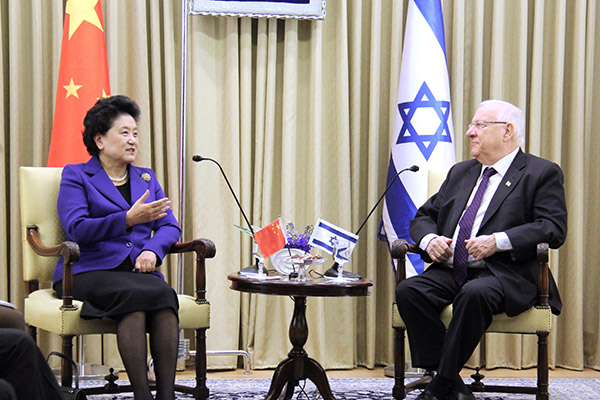
Vice-Premier Liu Yandong (L) meets with Israeli President Reuven Rivlin in Jerusalem on March 29.[Photo by Zhang Yunbi/China Daily]
China and Israel agreed on March 29 to start long-awaited negotiations on a free trade agreement.
The consensus came during talks in Jerusalem between Vice-Premier Liu Yandong and Israeli Prime Minister Benjamin Netanyahu.
While addressing the second meeting of the China-Israel Joint Committee on Innovation Cooperation after the talks, Netanyahu said, “This (the consensus on starting FTA talks) is a momentous development and we are ready to do so right away.”
Netanyahu noted that China is now Israel’s third-largest trading partner, with annual trade of over $10 billion. “We have ... the potential for a lot more,” he said.
Liu said cooperation on innovation is developing rapidly in various fields such as the economy and trade, and she suggested “reinforcing the effective dovetailing of innovation strategies” on both sides.
Bilateral trade has increased notably since the two countries established diplomatic ties in 1992. Ministry of Commerce spokesman Shen Danyang confirmed in March last year that the two countries had completed a feasibility study for a free trade agreement.
Last year, bilateral trade volume reached $11.4 billion, a year-on-year increase of 5 percent. China’s total investment in Israel has reached $6 billion.
Israeli President Reuven Rivlin told Liu during a meeting on March 29 that his country hopes to further strengthen cooperation in fields such as science, technology, innovation, agriculture and culture, which would serve the two countries’ common interests.
Liu Baolai, former Chinese ambassador to the United Arab Emirates and Jordan, said, “There is still great potential for economic, trade and culture cooperation,” since China’s 13th Five-Year Plan (2016-2020) is unfolding and there is a great need to boost growth through innovation.
